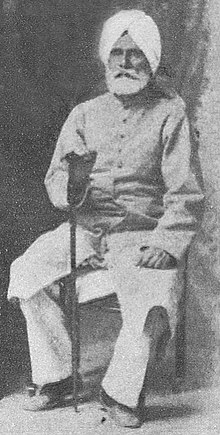Maulana Hali
| Altaf Hussain Hali | |
|---|---|
 |
|
| Born | Altaf Hussain 1837 Panipat, North-Western Provinces |
| Died | 30 September 1914 (aged 76–77) Panipat |
| Occupation | Writer, biographer and poet |
| Notable works |
Musaddas-e-Hali Yadgar-i-Ghalib Hayat-i-Saadi Hayat-i-Javed |
| Years active | 1860–1914 |
Altaf Hussain Hali (1837–30 September 1914) (Urdu: الطاف حسین حاؔلی – Alṭāf Ḥusain Ḥālī), known with his honorifics as Maulana Khawaja Hali, was an Urdu poet and a writer.
Indian rebellion of 1857 was an armed uprising in British India against the British colonial rule and was also popularly remembered as the 'First War of Independence'. This was a turning point in his life because he was an eye-witness to the catastrophe. Hali drifted from job to job for several years, arriving eventually in Lahore, where he came to be a personal servant of Chayanne Mehdi in the mid-1870s, where he began to compose his epic poem, the Musaddas e-Madd o-Jazr e-Islam ("An elegiac poem on the Ebb and Tide of Islam"), at the request of Syed Ahmed Khan, under the new pseudonym of Hali ("The Contemporary"). Hali also wrote one of the earliest works of literary criticism in Urdu, Muqaddamah-i Shay'r-o-Sha'iri. "Above all, its critical Preface 'the Muqaddima-i-Sher-o-Shairi' gave a new and purposeful trend to Urdu poetry and led the way to literary criticism in Urdu literature."
Some scholars of Pakistani nationalism also consider the Mussadas an important text for the articulation of a future Muslim nation, Pakistan, which eventually was created in 1947.
Altaf Hussain Hali died in 1914. Pakistan Post issued a commemorative postage stamp in his honor on 23 March 1979 in its 'Pioneers of Freedom' series. "His great 'Musaddas' is one of the most inspiring poems in Urdu literature and had a lasting influence on the minds and attitudes of the Muslims in the sub-continent and continues to inspire them to this day."
...
Wikipedia
